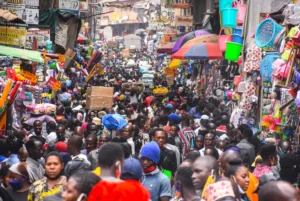
A big section of Kampala traders, especially in Kikuubo and Kiseka Market, have distanced themselves from a rumored citywide strike, warning it would hurt small businesses and lead to financial losses.
The strike rumors have been linked to frustrations over the Uganda Revenue Authority’s Electronic Fiscal Receipting and Invoicing Solution (EFRIS), rising operating costs, and complaints about foreign traders dominating local retail spaces.
Speaking at Kiseka Market on Thursday, August 14, 2025, car spare parts dealers’ leader Alex Kirabira dismissed the strike calls as distractions.
“We have bills to pay and families to feed. Every hour a shop is closed means lost income. We’ve agreed as Kiseka traders to remain open,” Kirabira said.
He admitted the system has gaps but insisted the solution lies in engaging the Uganda Revenue Authority, the President, and relevant ministries through Kampala City Traders Association (KACITA).
From Kikuubo, founding KACITA member Zziwa Livingstone echoed the same stance.
“Our customers rely on us for affordable goods and services. We cannot disappoint them. We believe in giving KACITA a chance to negotiate,” he said, warning traders against fake messages circulating on social media.
KACITA chairman Thaddeus Musoke Naginda confirmed on Wednesday, August 13, that the association is not calling for a strike.
“We are actively engaging the government and will meet the President, URA, and ministries before the week ends,” Musoke told journalists.
He accused “masqueraders” of trying to destabilize Kampala’s business environment and urged traders to carry on with their work.
While rejecting the strike for now, traders say the real issues EFRIS challenges, high taxes, and the influx of foreign traders must be addressed.
A KACITA insider told us that if the upcoming talks fail, pressure for action could rise. For now, Kampala’s business hubs remain open, with traders placing the ball in the government’s court.

















